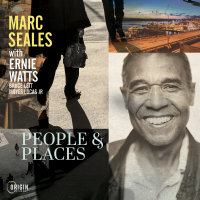Home » Jazz Articles » Big Band Report » Los Angeles Jazz Institute Festival - Woodchopper's Ball: Part 1-4
Los Angeles Jazz Institute Festival - Woodchopper's Ball: Part 1-4
Four Points by Sheraton at LAX
Los Angeles, CA
May 23-27, 2018
Part 1 | Part 2 | Part 3 | Part 4
The Los Angeles Jazz Institute (LAJI), under Ken Poston, has continued for some thirty years to keep alive and celebrate jazz and its rich legacy, largely, but not exclusively, focused on West Coast Jazz, curating a large archive of recorded music, scores, film, and general memorabilia and presenting live music performances. It also releases special rare recordings on CD. Twice each year the LAJI presents a first-class, four-and-a-half day festival, in late May and in late October, generally built around a theme or the work of a particular significant musician. Drawing upon their large archive of musical scores, and a large group of mainly Los Angeles-based jazz musicians, young and not-so-young, and special guests, the festival re-creates a feast of marvelous, historically important music, and draws visitors from across the USA, and from further afield -UK, Europe, Australia and beyond. In addition to the outstanding musical performances, Ken Poston incorporates fascinating and well-sourced, daily film sessions pertinent to the music being presented, and stimulating, daily panel discussions with the musicians. Many of those in the audience have attended these festivals for many years and have had repeated rich experiences of a wide range of music, and have connected regularly in person with a large array of the great jazz musicians past and present who continue to commit their talents and time to these excellent musical events. From a musical standpoint, these festivals create vital crossroads between the old and the new -timeless musical arrangements brought to life by a cross-generational mix of fine musicians who play the charts authentically and with great care, whilst bringing the freshness of their often more contemporary improvised solos. Old bottles, new wine, as they say.
Recently they presented a marvelous celebration of the music of the great bandleader

Woody Herman
band / ensemble / orchestra1913 - 1987

Terry Gibbs
vibraphoneb.1924

Bobby Shew
trumpetb.1941

Mark Lewis
saxophoneb.1958
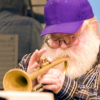
Ron Stout
trumpet
John Fedchock
tromboneb.1957

Frank Tiberi
saxophone, tenorb.1928

Larry McKenna
saxophone, tenor1937 - 2023

Roger Neumann
saxophone, tenorb.1941

Gary Anderson
woodwindsb.1947
Jerry Pinter
saxophone, tenor
Mike Brignola
saxophone, baritone
Alan Broadbent
pianob.1947

Jeff Hamilton
drumsb.1953
Jim Rupp
drums
Ken Peplowski
woodwindsb.1959
Alex Budman
fluteb.1973
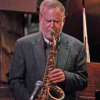
Kim Richmond
saxophone
Scott Whitfield
tromboneb.1963
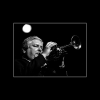
Dan Barrett
trumpetb.1955

Carl Fontana
trombone1928 - 2003
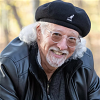
Bill Harris
saxophone
Don Menza
saxophoneb.1936

Harry Allen
saxophoneb.1966

Stan Getz
saxophone, tenor1927 - 1991

Flip Phillips
saxophone, tenor1915 - 2001

Ed Shaughnessy
drums1929 - 2013
Organized chronologically, the concerts, film presentations and panels each began with Woody's earliest music and worked their way through the five decades sequentially, as the Woody Herman musical story unfolded over the four-and-a-half days. Within the scope of the festival and rehearsal time, and in view of Herman's massive recorded output, the music presented was carefully chosen, representative and comprehensive, all the key Herman music being included. There was a good mix of big band and smaller group concerts. There were no major omissions -larger scale works such as Broadbent's "Blues In The Night" and the Children of Lima orchestral scores were clearly beyond the scope of this festival.
Ken Poston, assisted by Eric Fankhauser, Lori Poston, Kate Demerjian and the other volunteers who make this happen, are again to be congratulated for organizing yet another fine festival. The LAJI evidently runs on a small budget, and with gradual diminution in numbers of attendees compared to when these events began in the early 1990s, it is presumably an ever-growing challenge to maintain these festivals into the future. It is to be hoped that these excellent festivals can remain viable long into the future, and attract new generations who appreciate the richness of this large and exciting musical legacy. The next LAJI festival is "Something Cool—Celebrating the Great Vocalists of The West Coast Jazz Era," 25-28 October, 2018.
Carnegie Hall 1946 -Directed by Michael Berkowitz
bass, electric
"
data-original-title="" title="">Michael Berkowitz, with Special Guest Ken Peplowski
The re- creation of this historic concert of the Woody Herman First Herd, featured Ken Peplowski on clarinet in the Herman role. The performance opened with Michael Berkowitz
bass, electric
Ralph Burns
piano1922 - 2001

Barry Zweig
guitar, electricb.1942

Billy Bauer
guitar1915 - 2005
Dick Weller
drumsThe "Ebony Concerto," written by composer Igor Stravinsky for the First Herd, was an ambitious piece in its day, and a challenge for the original Herd at the time. Its artistic worth has been debated ever since, but it was an early example of collaboration between the jazz and classical worlds, broadly part of what would later be considered third stream. It was certainly a departure from the Herd's usual fare, and makes up for its lack of swing with interesting textures, rhythms and quirky melodies that the audience don't necessarily whistle as they leave. It is a complex piece, a labour of love that demands a large slab of rehearsal time, which could be underestimated. This was such an occasion, and although mostly it was well executed, it came off the rails during the third movement. For those who love the piece, all its character was there, the playful clarinet lines, the staccato sectional interplay, the sharp dissonances, the sometimes lugubrious reed sounds, eerily muted trumpets, smeary trombone blasts and intermittent moments of swing and bluesy melodic touches.
The band was in full swing again for "Your Father's Moustache," with its cheerful brass section intro and sweeping clarinet from Peplowski. Solo features included a confident trumpet solo from Mark Lewis, muscular trombone from
Paul Young
tromboneRalph Burns' fine "Summer Sequence" followed, in its original three movements (Burns later added his fourth movement for the Second Herd, to feature Stan Getz). The first movement which Burns originally described as "slow and peaceful" featured Barry Zweig's haunting guitar melody, Steinberger's piano solo conversations with the band, Barrett's soulful trombone, and Doug Weller's crisp brushwork. The second movement, dubbed "fast and furious" by Burns, opened with a fiery brass intro and agitated piano chords, leading into
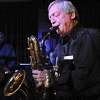
John Mitchell
saxophoneDave Stone
bass, acousticRusty Higgins
saxophone, alto"Wild Root" began with its happy, unison bebop reed section melody, with excellent solo work from Harry Allen's tenor, John Mitchell's baritone, Paul Young's trombone and a soaring clarinet solo from nearly-90-year-old

Gene Cipriano
saxophoneFilm Session 1. The Band That Plays the Blues -Rare Films from the Los Angeles Jazz Institute Archive
Ken Poston continued his tradition of well-crafted presentations of historic film footage to tell the Woody Herman story. He described Woody's beginnings with theIsham Jones
b.1894
Johnny Hodges
saxophone, alto1907 - 1970
Vido Musso
saxophone, tenorb.1913

Jimmy Rowles
piano1918 - 1996

Dave Tough
drums1907 - 1948
Poston described the transition of the band into what would soon become known as the First Herd, the importance of

Cab Calloway
composer / conductor1907 - 1994

Pete Candoli
trumpet1923 - 2008

Neal Hefti
trumpet1922 - 2008

John LaPorta
clarinet1920 - 2004
Sonny Berman
b.1925
Shorty Rogers
trumpet1924 - 1994

Conrad Gozzo
trumpet1922 - 1964

Chuck Wayne
banjob.1923

Don Lamond
drums1920 - 2003

Red Norvo
vibraphone1908 - 1999

Billie Holiday
vocals1915 - 1959

Louis Armstrong
trumpet and vocals1901 - 1971
Concert 1: Flip the Whip -Harry Allen Plays Flip Phillips
The first of the small group concerts, this was a happy celebration of Flip Phillips (1915-2001), very individual and brilliant tenor saxophonist and one of the unforgettable characters of the Woody Herman story of the mid 1940s. Led by tenor-man Harry Allen, it was a first-rate quartet with
Josh Nelson
pianob.1978

Paul Kreibich
drumsBeginning with two pieces recorded by the Flip Phillips quintet on Rock With Flip in 1957, "Lady's in Love With You" was a medium-up swinger, featuring three mighty tenor choruses from Allen, bright and playful piano choruses with solid block-chording from Nelson, bouncy bass solo from Stone and trades with Kreibich's sizzling drums. "Lemon Aid 21" was an easy swinger over "rhythm changes," its riffy, cheeky melody full of wide intervallic leaps. Nelson's opening solo featured low register block chords with a nice, behind-the-beat swing. Allen followed, initially accompanied only by bass, with a raunchy big-toned solo and some mighty double-timing. Stone alternately walked and be-bopped through his solo chorus, before the leaping final melody returned.
A shift of mood, and Burke and Van Heusen's ballad "But Beautiful" was next, originally recorded by Flip in 1949, in a quartet. Allen gave the melody a breathy, expressive reading, with tender, sensitive accompaniment from the rhythm section. Nelson's piano solo, at once both thoughtful and playful, evolved into more teasing, tickling, treble finger-work and then faded gently to its ending. Allen played a passionate, probing tenor solo half-chorus, covering a huge dynamic range, leading into the final sixteen bars of the head, gently caressing the melody, and finishing with a superb, adventurous solo cadenza.
"The Claw," a Phillips original, was introduced as having been recorded on a 1981 album of 'scary tunes,' called Flipenstein. This was a boppy, up-tempo tune based on "rhythm changes." Nelson began his piano solo with a Monkish entrance, leading into a swinging solo running up and down the register, with more Monkish inflections. Allen followed with a virile tenor solo, then Stone with a virtual 'lesson' in walking bass lines and tricks, and finally, energetic drum trades with quirky Nelson piano and muscular Allen tenor.

Hoagy Carmichael
piano1899 - 1981
"A Sound Investment," which Flip had recorded with Scott Hamilton, was a fast tune, based on the form of Sweet Georgia Brown. Allen led into a fierce tenor solo, supported by a driving rhythm section, notably the hard-swinging drumming of Paul Kreibich. A vigorous Nelson piano solo followed, with teasing piano work up and down the keyboard. Drum trades with Kreibich, who, it was announced, was celebrating his birthday, and then a powerful, sizzling drum solo chorus, more fast-and-furious Harry Allen tenor solo choruses, and on to the final head. The generous ovation from the audience marked an inspired performance by a magnificent tenor saxophonist and his quartet.
Panel 1: Terry Gibbs with Kirk Silsbee
At 93, Terry Gibbs (b Oct 13, 1924) exudes a great deal of energy and vitality. His 2017 release, 92 Years Young: Jammin' at the Gibbs House has been hugely successful, showcasing the vibraphone-playing nonagenarian in sparkling form. For this festival, he was an important inclusion, as he is the only surviving member of Woody Herman's Second Herd of the late 1940s. Although the audience was not treated to his playing on this occasion, the indefatigable vibraphonist Terry Gibbs held the floor for a happy hour of 'fireside chat' with Kirk Silsbee.Gibbs remarked that Woody's Second Herd was at the time considered the best big band in the world because of its superb ensemble playing and its brilliant soloists. For Woody, the most important priority was a tight ensemble sound, "the band sounding good as a whole," and this, he said, was the mark of his great leadership. Woody liked climactic endings and would re- arrange the order of choruses in the arrangements in order to "always end a piece 'big.'"
He mentioned that the famous "Early Autumn" was recorded in nine takes, and that he and Stan Getz had lobbied Woody to use Take #4 as they felt it contained their best solos. Woody resisted, choosing instead Take #8 for release, which they considered an inferior take. The rest is history, the recording gaining instant and lasting fame for Getz, and Gibbs and Getz were each Downbeat poll-winners that year!
He spoke fondly of two band-mates as being his lifelong best friends -pianist

Lou Levy
piano1928 - 2001

Conte Candoli
trumpet1927 - 2001
Gibbs spoke about his 'Terry Gibbs Dream Band' of the late fifties featuring Conte Candoli on first trumpet,

Frank Rosolino
trombone1926 - 1978
Joe Maini
saxophone, altob.1930
Silsbee and Gibbs spoke about the influence of the Chubby Jackson quintet on Woody's Second Herd, and the adoption of the

George Wallington
piano1924 - 1993

Charlie Ventura
saxophone, tenor1916 - 1992
Gibbs spoke fondly of fellow vibraphonist Red Norvo, who had preceded him in Woody's band, and about their different styles, Red's style more rooted in the Swing era. Years later, Gibbs recalled playing at a vibraphone summit concert featuring himself,

Lionel Hampton
vibraphone1908 - 2002

Gary Burton
vibraphoneb.1943
Gibbs spoke fondly of the brilliant lady pianist/vibraphonist

Terry Pollard
vibraphone1931 - 2009

Thad Jones
trumpet1923 - 1986
Gibbs also spoke fondly of drummer/arranger
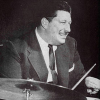
Tiny Kahn
drums
Mel Lewis
drums1929 - 1990

Chico Hamilton
drums1921 - 2013

Al Cohn
saxophone, tenor1925 - 1988

Johnny Mandel
arrangerb.1925
Kirk Silsbee noted that Gibbs had worked with many clarinetist/leaders throughout his career including

Benny Goodman
clarinet1909 - 1986

Buddy DeFranco
clarinet1923 - 2014
Concert 2: Characteristically B.H. -Dan Barrett Plays Bill Harris
Trombone legend Bill Harris, one of the most individual trombonists in all of jazz, was a major voice and much-loved character in the First and Second Herman Herds of the 1940s. In happy tribute to Harris' music and his contribution to the Herman story, Trombonist Dan Barrett, whose influences are wider and probably reach back earlier than Harris, led a capable young quintet with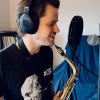
Jason Fabus
saxophoneChris Dawson
pianoTyler Kreutel
drumsOpening with "Pennies From Heaven," the bone-and-sax frontline led off with the melody in cheerful interplay and deft key changes between choruses. Fabus led of with a big-toned, swinging tenor solo, followed by Barrett's fluid, full-bodied bebop trombone. Dawson played some sinuous right-handed piano lines, before frontline trades with drummer Kreutel. Featured next was "Dark Shadows," a slow swinger, which Harris had recorded with Flip Phillips. Fabus played a soulful, straight-ahead tenor solo, and Barrett continued with a warm, swinging solo with playful slipping and sliding. Dawson's impish, economic piano half-chorus led into the final return of the melody to the two horns. Ellington's "In A Mellow Tone," which Harris had recorded with Ellington tenor giant

Ben Webster
saxophone, tenor1909 - 1973
"With Someone New," by Flip Phillips, was a tour-de-force for young tenor-man Jason Fabus, who took the melody and then proceeded to a superb solo—with his big sound, feel and dynamics, breathy tones when at low volume and a full-bodied sound at upper volumes. Dan Barrett played a soulful, plangent solo chorus, with his solotone-muted trombone, before Fabus took the melody for the final time, and engaged in a conversational duet cadenza with Barrett.
"Crazy Rhythm" featured happy trombone choruses from Barrett, interspersed with witty Bill Harris-like quotes, driving tenor sax and cheeky piano solos from Fabus and Dawson, drum trades with Kreutel, a very rhythmically supple drum solo, and an aptly crazy, punchy ending. Stan Getz' tune "And The Angels Swing" was a minor-key, mid-tempo swinging bebop tune. Dawson shone with his quirkily-accented, serpentine bebop lines, as did Fabus, with his assertive, masterful post-bop solo. Leader Barrett's contrasting bone solo led to exciting drum trades and nice bone-sax harmonies on the final melody.
Into ballad mode with "Everything Happens To Me," Dan Barrett's trombone melody was supported by the unexpected pleasure of Jason Fabus harmonizing the melody with piano accordion and taking the bridge. A nice bebop accordion solo followed, full of great ideas but not yet the polish of his terrific tenor work. A neat Dawson piano solo preceded the bone and accordion walking off stage, down the aisle into the audience for the final chorus. The concert finished with a happy "John Hardy's Wife," by

Mercer Ellington
trumpet1919 - 1996
Concert 3: The Four Brothers Sound
Ken Poston introduced the concert with a brief description of the history of the Four Brothers' sound—its origin in the octet, led by trumpeter Tommy Di Carlo that played Pontrelli's in Los Angeles in early 1947, with a four-tenor-sax lineup of
Herbie Steward
saxophone1926 - 2003

Zoot Sims
saxophone, tenor1925 - 1985

Jimmy Giuffre
clarinet1921 - 2008
Gene Roland
b.1921
Lester Young
saxophone1909 - 1959

Adam Schroeder
saxophone, baritoneb.1978

Pepper Adams
saxophone, baritone1930 - 1986
A softer, Four Brothers sound was featured on the ballad standard, "It Never Entered My Mind." Peplowski led the melody, evoking a Getzian sound, over a lush sax section cushion of more contemporary harmonies, with Schroeder's baritone taking over the melody. Nelson played some beautiful piano solo lines backed by the reeds, with a dynamic return to the melody and a final chord in modal fourth harmonies. "Begin The Beguine and Don't Stop" was a medium-up swinger with a mix of unison and quite advanced brotherly four-part harmony, and stellar solos from Peplowski in brilliant double time, Allen's big tenor, Schroeder's energetic baritone and lastly, Neumann's vigorous tenor. This was inspired ensemble arranging, and an interesting reimagining and advancement of the Four Brothers sound.

Gerry Mulligan
saxophone, baritone1927 - 1996

Allen Eager
saxophone1927 - 2003

Brew Moore
saxophone, tenor1924 - 1973
From Finian's Rainbow, an unlikely choice of "How Are Things In Glocca Morra," by Lane and Harburg, began with a mournful introduction and verse, leading into the main melody, with neatly descending and quite beautiful harmonies and a softer brotherly ensemble sound. The final offering was Frank Loesser's "Luck Be A Lady Tonight," beginning with a super, strong introduction/verse, and then a boppy, up-tempo, unison rendition of the main melody. Josh Nelson played an agile, colourful piano solo, focusing on the lower register. The reeds followed with double chorus solos: Peplowski led off with a fluid tenor solo that began phlegmatically and became more boisterous; Schroeder with a muscular, Pepper-ish baritone solo, Neumann with a mercurial solo that became increasingly bold and bluesy. Allen unleashed a sanguine, powerful solo that led to a mighty, powerhouse drum solo from Doug Weller and a strong shout chorus. All in all, the concert showcased the durability of the Four Brothers sound, both in its classic Lestorian sound but also many new and distinct textures and sounds that this fine instrumental combination could inspire.
Tags
Big Band Report
Simon Pilbrow
United States
California
Los Angeles
Los Angeles Jazz Institute
Woody Herman
Terry Gibbs
Bobby Shew
Mark Lewis
Ron Stout
John Fedchock
Frank Tiberi
Larry McKenna
Roger Neumann
Gary Anderson
Jerry Pinter
Mike Brignola
Alan Broadbent
Jeff Hamilton
Jim Rupp
Ken Peplowski
Alex Budman
Kim Richmond
Scott Whitfield
Dan Barrett
Carl Fontana
Bill Harris
Don Menza
Harry Allen
Stan Getz
Flip Phillips
Ed Shaughnessy
Michael Berkowitz
Ralph Burns
Barry Zweig
Billy Bauer
Alan Steinberger
Dick Weller
Paul Young
Keith Bishop
John Mitchell
Dave Stone
Rusty Higgins
Gene Cipriano
Isham Jones
Frankie Carlson
Andrews Sisters
Johnny Hodges
Vido Musso
Jimmy Rowles
Dave Tough
Pete Candoli
Neal Hefti
John La Porta
Margie Hyams
Shorty Rogers
Conrad Gozzo
Chuck Wayne
Don Lamond
Red Norvo
Billie Holliday
Louis Armstrong
Josh Nelson
Paul Kreibich
Hoagy Carmichael
Lou Levy
Conte Candoli
Frank Rosolino
Joe Maini
George Wallington
Charlie Ventura
Lionel Hampton
Gary Burton
Terry Pollard
Thad Jones
Tiny Kahn
Mel Lewis
Chico Hamilton
Al Cohn
Johnny Mandel
Benny Goodman
Buddy de Franco
Jason Fabus
Chris Dawson
Nick Schaadt
Tyler Kreutel
ben webster
Mercer Ellington
Tommy De Carlo
Herbie Steward
Zoot Sims
Jimmy Giuffre
Gene Roland
Lester Young
Pepper Adams
Gerry Mulligan
Allan Eager
Brew Moore
Comments
PREVIOUS / NEXT
Harry Allen Concerts
Nov
22
Sat

Harry Allen & French’ment Jazz Quartet
Sunset-SunsideParis, France
Support All About Jazz
 All About Jazz has been a pillar of jazz since 1995, championing it as an art form and, more importantly, supporting the musicians who make it. Our enduring commitment has made "AAJ" one of the most culturally important websites of its kind, read by hundreds of thousands of fans, musicians and industry figures every month.
All About Jazz has been a pillar of jazz since 1995, championing it as an art form and, more importantly, supporting the musicians who make it. Our enduring commitment has made "AAJ" one of the most culturally important websites of its kind, read by hundreds of thousands of fans, musicians and industry figures every month.
Go Ad Free!
To maintain our platform while developing new means to foster jazz discovery and connectivity, we need your help. You can become a sustaining member for as little as $20 and in return, we'll immediately hide those pesky ads plus provide access to future articles for a full year. This winning combination vastly improves your AAJ experience and allow us to vigorously build on the pioneering work we first started in 1995. So enjoy an ad-free AAJ experience and help us remain a positive beacon for jazz by making a donation today.

Los Angeles
Concert Guide | Venue Guide | Local Businesses
| More...








 Buy Now
Buy Now



